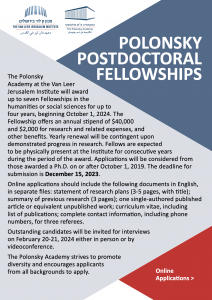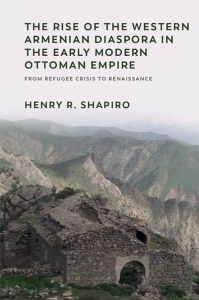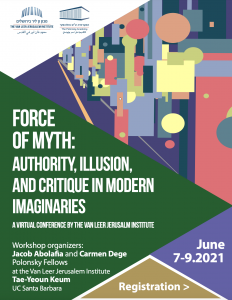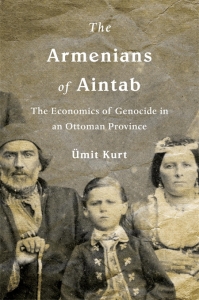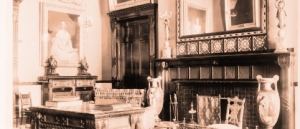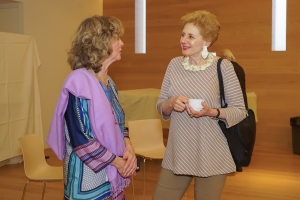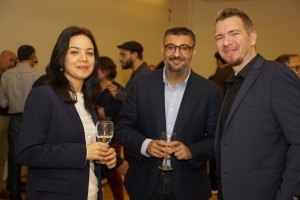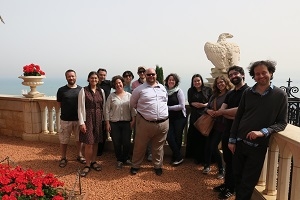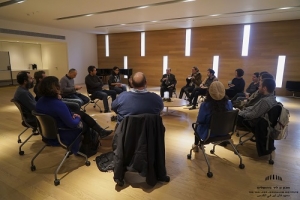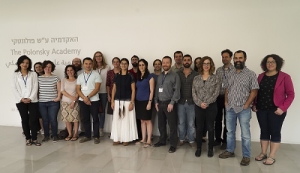December 2024
- Dr. Qiao Yang published a paper in the Journal of the Royal Asiatic Society, “Lesser elite in crisis: family strategies of divination (yinyang) school instructors in the Yuan–Ming transition
- Dr. Orel Beilinson chaired the East-Central Europe section of the Postgraduate Workshop: Using archives and research libraries in Eastern Europe and the former Soviet Union organized by BASEES (British Association for Slavonic & East European Studies)
Dr. Anastasiia Zinevych talked about: “Analysis of delusional narratives” at the ISPS-IL (the International Society for Psychological and Social Approaches to Psychosis Conference) that took place in the Academic College of Tel Aviv–Yaffo, The Mefarish Institute for Psychotherapy Research and Teaching): “Psychosis in a Mad World”
https://www.mifrasim.mta.ac.il/en/psychosis-in-a-crazy-world
November 2024
Dr. Orel Beilinson gave a talk at the Cultural Transfers: A Transnational Seminar held by ENS-PSL and the University of Leipzig: https://www.ens.psl.eu/agenda/transferts-culturels/2024-12-13t090000
September 2024
- Dr. Ori Werdiger gave a talk “Léon Askenazi and Rabbi Sirat during the early CUEJ years [in Hebrew],” Jews of Algeria Throughout the Generations, International Conference, Yad Ben Zvi, Jerusalem
- Dr Daniel J. Tolan has co-edited the landmark volume Participation in the Divine: A Philosophical History, From Antiquity to the Modern Era, published with Cambridge University Press (https://doi.org/10.1017/9781009440028).
Participation is a concept thinkers throughout history have used to justified existence itself, explaining temporal being vis-à-vis God. The essays in this volume analyse and explore this key concept in the history of Western thought.
This volume had a panel dedicated to its honour at the 2024 American Academy of Religion in San Diego as part of the Platonism and Neoplatonism Unit.
Augoust 2024
Dr. Sinja Küppers presented at the XIX. International Conference on Patristic Studies in Oxford (UK), 5-9 August 2024 as part of the main conference workshop on Inequality and Impediments to Virtue sponsored by the Flourishing in Early Christianity Project at Australian Catholic University’s Institute for Critical Religion and Inquiry, the Human Flourishing Program at Harvard University, and the Institute for Studies of Religion at Baylor University. In her presentation on “Inequality is the Starting Point of a Pleasant Life”: Human Flourishing in Christian Philosophy she argues that Christians deemed secular class distinctions essential to human flourishing and reproduced them in theoretical treatises (such as Theodoret of Cyrus, On providence 6.22) and the practical design of ascetic communities in the third and fourth centuries C.E
July 2024
Secularization in Modern Jewish Thought
Science in crisis? Specialization,facts, and theory in European journals in the 1870s
June 2024
Energy and Empire
Beneath the Sands: Towards a Political Ecology of the Uncultivable
May 2024
Is Purposive Interpretation Our Law?
Petrarch in Global Translation
April 2024
When the Local Looks Back at The Global: On Blackness, Identity, and Political Activism in the Ethiopian Community in Israel
This cooperation resulted in the publication of a special issue Local Blackness of the journal Theory and Criticism, Van Leer Press, Volume 59.
March 2024
The Hidden Cost and Labor behind Jewish Medical Books
Haifa Conference for Politics and Arab Society in Israel
Polonsky Academy Fellow and an activist Dr. Ameer Fakhoury took an active part in the 2nd Haifa Conference for Politics and Arab Society in Israel. Ameer participated in the panel Jewish and Democratic – between the protest and a war: changes and processes in the nature of Israeli governance, led by Doron Navot, the head of Jewsh-Arab center at the Haifa University.
December 2023
The British Association for Modernist Studies Essay Prize
In December, Polonsky Academy Fellow Dr. Michael Allen, won the British Association for Modernist Studies Essay Prize for an essay . Here is a twitter link. Modernist Cultures, the society’s journal, will publish the essay, “Derek Walcott, Robert Lowell, and the Domestic Architecture of Autobiographical Poetry,” later this year.
November 2023
British Journal of Middle East Studies
An artcle by the Polonsky Academy Fellow, Dr. Avi-ram Tzoreff, “Confronting Minorization: Colonial Missionaries and Ottoman Millets in the Eyes of a Nineteenth Century Baghdadi Rabbi“, was published by the British Journal of Middle East Studies
November 2023
Women in Roman Higher Education
Polonsky Academy Fellow Dr. Sinja Kueppers’s dissertation spotlight on Women in Roman Higher Education was published by the Society for Classical Studies: https://classicalstudies.org/scs-blog/torilee/blog-women-roman-higher-education-marginalized-learners-teachers-and-intellectuals
October 2023
Azrieli early career grant
Congratulations to Dr. Ella Klik, Polonsky Academy Alumna, who has received the Azrieli Early Career grant 2023. This prestigious grant is awarded every year to two new faculty members in the humanities in Israeli universities. The generous grant will allow Ella to further developing the project Imagining Data Futures: From DNA to Outer Space.
October 2023
God as Patient
The Medical Discourse of Lurianic Kabbalah
Congratulations to Polonsky Academy Alumni, Assaf Tamari on publishing of his book God as Patient The Medical Discourse of Lurianic Kaballah, by Van Leer Press and Magnes Press.
a broken world, in which even God Himself is in a state of deep crisis, what is required in order to mend the rupture? How can one heal God and his world? Moreover, what might allow our actions to be effective? These questions stand at the heart of the Lurianic Kabbalah, the apex of the Safedian intellectual and religious renaissance of the sixteenth-century, and one of the constituting phenomena of Modern Jewish thought. God as Patient presents medical discourse – the knowledge, language, and practice of medicine – as a significant key to our understanding of the Lurianic search for a way to mend reality, and first and foremost the Godhead. The book reads together the Lurianic texts alongside the medical writings of R. Hayyim Vital, R. Isaac Luria’s chief disciple, and a medical practitioner. Consequently, the book analyzes how medicine becomes the model for the Lurianic language of action. In its final part, the book shows how God becomes in this Kabbalah the ultimate patient of the Lurianic Kabbalist, who in turn becomes the private court physician of the King of Kings, and needs, like every physician, the proper modes of healing to accomplish his task.
July 2023
“Aristotle’s Nicomachean Ethics on the Sameness of Friendship and Justice”
Polonsky Academy Fellow, Dr. Bradford Jean-Hyuk Kim published an article “Aristotle’s Nicomachean Ethics on the Sameness of Friendship and Justice” in Apeiron magazine
June 2023
Games to Play and Games not to Play by Uri Weiss
Congratulations to Polonsky Academy Alumni, Uri Weiss on publishing of his (together with late Joseph Agassi) book Games to Play and Games not to Play Strategic Decisions via Extentions of Game Theory, at the Springer publishing house.
“This book contributes to the theatrical discussions of equilibria that rest on error – in which we include mistaken choices of games to play”
“Our study of games avoidance adds to game theory the meta-game of choosing what game to play and what game to avoid playing, and that both players and planners can generate”
June 2023
Kedma Mizraha: R. Binyamin, Binationalism and Counter-Zionism
Congratulations to Polonsky Academy Fellow, Dr. Avi-ram Tzoreff on publishing his book
Kedma Mizraha: R. Binyamin, Binationalism and Counter-Zionism
This book focuses on the character of the author Yehoshua Radler-Feldman (R. Binyamin; hereinafter: RB). RB was one of the fiercest critics of the processes involved in the creation of the Zionist Yishuv in Palestine from within the Yishuv itself. These processes included the adoption of spatial and economic practices as well as sociolinguistic and cultural perceptions. Accordingly, his attitudes provide a foundation for a critical examination of these processes and for a better understanding of the hegemonic Zionist cultural repertoire in its historical contexts. This can in turn inform an examination of the repertoire of the different patterns of resistance that were created through RB’s attempts to confront hegemonic Zionist discourse.
May 2023
Polonsky Seminar – Prof. Hans Ulrich Gumbrecht
Prof. Hans Ulrich Gumbrecht from Stanford University presented at the Polonsky seminar in the frameworks of the seminar special edition series dedicated this year to the topic of Time. The title of the presentation was What Forms do the Future, the Present, and the Past of 2023 Have? A Phenomenological Reflection and the Historicity of Time
May 2023
An article in Analysis
An article “Austerity in Mohist ethics” by the Polonsky Academy Fellow, Dr. Bradford Jean-Hyuk Kim was published in the Analysis. Analysis, which was founded in 1933, is the most established and esteemed journal for short papers in philosophy.
May 2023
Polonsky Seminar – Mr. Niel McGregor
On May 14, we had a special guest at the Polonsky Academy seminar, Mr. Neil Macgregor, a former director of the British Museum and the National Gallery in London as well as one of the founders of the Humbolt Forum. Mr. McGregor presented a talk named Exhibiting the Contaminated Past
May 2023
International conference A partnership-based Israeli-Palestinian peace: Toward a Changed Paradigm
Polonsky Academy Fellow, Dr. Ameer Fakhoury was among the organisers of the panel named:
How can the Social Sciences in Israel Look Like under the New
Paradigm?
At the conference participated approximately 70 experts—Jewish, Palestinian, and international. Proposals, analyses, and conceptualizations of partnership-based peace were presented and discussed, and their influence on politics, civil society, and academic research was examined.
May 2023
Inter-institutional Workshop on Political Economy and the Study of Neoliberalism
On May 2, 2023 The inter-institutional Workshop on Political Economy and the Study of Neoliberalism, in conjunction with The Van Leer Jerusalem Institute and the Buber Society of Fellows at The Hebrew University of Jerusalem took place in the VLJI campus. The workshop was initiated and organised by the Polonsky Academy Fellow Dr. Roni Hirsch in cooperation with the Polonsky Fellowship Alumni Dr. Ronen Mandelkern and more.
April 2023
Polonsky Salon – Dr. Alma Igra in conversation with Prof. Christopher Otter
April 2023
Seeking Bread and Fortune in Port Said
Congratulations to Polonsky Academy Alumna, Dr. Lucia Carminati on publishing her book Seeking Bread and Fortune in Port Said Labor Migration and the Making of the Suez Canal, 1859–1906
Seeking Bread and Fortune in Port Said probes migrant labor’s role in shaping the history of the Suez Canal and modern Egypt. It maps the everyday life of Port Said’s residents between 1859, when the town was founded as the Suez Canal’s northern harbor, and 1906, when a railway connected it to the rest of Egypt. Through groundbreaking research, Lucia Carminati provides a ground-level perspective on the key processes touching late nineteenth-century Egypt: heightened domestic mobility and immigration, intensified urbanization, changing urban governance, and growing foreign encroachment. By privileging migrants’ prosaic lives, Seeking Bread and Fortune in Port Said shows how unevenness and inequality laid the groundwork for the Suez Canal’s making.
March 2023
Polonsky Salon – Dr. Dotan Halevy talks to Prof. Prof. Avner Wishnitzer
What is the connection between clocks and feelings, time and power? What is the social and political meaning of waiting? How did modern technologies such as the train and the steamship influence the norms of punctuality and tardiness? And when and how did someone start deciding for us what time it is?
Dr. Dotan Halevy invited Prof. Avner Wyshnitzer to Polonsky Salon to talk about his recent book , Reading Clocks, Alla Turca: Time and Society in the Late Ottoman Empire (University of Chicago Press, 2015), published in Hebrew by Magnes Press in 2022,
February 2023
An article in The Point magazine
Dr. Rory O’Connell published an article Intelligent Life in issue 29 (Examined Life) of the magazine of philosophical writing The Point. The article will be also published in the printed version of the magazine.
February 2023
2023 Dan David Prize – Dr. Karma Ben Johanan
Polonsky Academy congratulates its former fellow, Dr. Karma Ben Johanan upon being awarded the prestigious Dan David prize for 2023. This is a great professional achievement and we are immensely proud of Dr. Ben Johanan.
Dan David prize was established with the goal of rewarding and encouraging innovative and interdisciplinary research that cuts across traditional boundaries and paradigms. Each year, three prizes of $1 million were awarded in rotating fields to those who made outstanding contributions to humanity.
February 2023
The Commission on Science, Technology and Diplomacy award – Dr. Alma Igra
Polonsky academy fellow, Dr. Alma Igra is recipient of the Commission on Science, Technology and Diplomacy 2023 Early Career Prize for her article British Scientific Humanitarianism in Vienna: Milk and Standards in Exchange.
“The winner of the STAND Early Career Prize 2023 is an outstanding work in the field of humanitarianism, in the interwar period. It is well researched, based on evidence, and draws interesting conclusions relating to the historical and the historiographical scene on international nutrition. This paper explores a novel topic in relation to science diplomacy, considering food and food related problems on an international and global scale. By doing so, the author also integrates discussion of scientific issues such as standardization, questioning the linearity of scientific objectivity. Another contribution of this paper was its analysis of a case focusing on the early interwar period, a period that has not featured prominently in scholarship on science diplomacy.”
February 2023
University of Oxford Award – Dr. Magdalena Janosikova
January 2023
American Historical Association’s Annual Meeting – presentation by Dr. Nimrod Ben Zeev
January 2023
An article by Dr. Adane Zawdu Gebyanesh
Polonsky academy fellow, Dr. Adane Zawdu Gebyanesh wrote an article for the Middle East Eye news website Ethiopian Israelis’ struggle for dignity is linked to Palestinians (January 28, 2023)
In his article, Dr. Zawdu Gebyanesh argues that the Israeli public’s indifference to the plight of captive Israeli citizen Avera Mengistu exposes the unequal value placed on lives in Israel.
January 2023
VLJI panel discussion
Polonsky Fellows Dr. Ameer Fakhoury and Dr. Avi-ram Tzoreff, participated in the panel discussion “Jewish-Arab cooperation where to? Following May 21 and November 22 elections”
The discussion was a part of the series “Where to now? The future of society and politics in Israel”, organized by VLJI and open to the public. You can watch it here
December 2022
New Books Network podcast with Dr. Karma Ben-Johanan
Polonsky Academy alumna, Dr. Karma Ben-Johanan gave an interview about her book Jacob’s Younger Brother: Christian-Jewish relationship after Vatican II (Harvard University Press, 2022) at the New Books Network podcast. You can listen to it here
November 2022
The 2023 call for applications is now open.
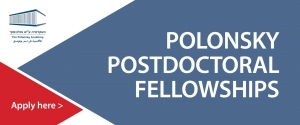
The Polonsky Academy at the Van Leer Jerusalem Institute will award up to seven Fellowships in the humanities or social sciences for up to four years, beginning October 1, 2023.
The Fellowship offers an annual stipend of $40,000 and $2,000 for research and related expenses, and other benefits. Yearly renewal will be contingent upon demonstrated progress in research. Fellows are expected to be physically present at the Institute for consecutive years during the period of the award. Applications will be considered from those awarded a Ph.D. on or after October 1, 2018. The deadline for submission is January 5, 2023.
Online applications should include the following documents in English, in separate files: statement of research plans (3-5 pages, with title); summary of previous research (3 pages); one single-authored published article or equivalent unpublished work; curriculum vitae, including list of publications; complete contact information, including phone numbers, for three referees.
Outstanding candidates will be invited for interviews on March 28-29 either in person or by videoconference.
The Polonsky Academy strives to promote diversity and encourages applicants from all backgrounds to apply.
Press here for the Call for Applications.
Press here for the Application Form.
November 2022
“An Imagined ‘Desert’ that is Indeed the Core of the Yishuv”: Rabbi Binyamin and the Emergence of Zionist Settler-Colonial Policies (1908-1914)
An article
“An Imagined ‘Desert’ that is Indeed the Core of the Yishuv”: Rabbi Binyamin and the Emergence of Zionist Settler-Colonial Policies (1908-1914), Jahrbuch des Dubnow Institut 18 (2019) by Dr. Avi-ram Tzoreff was published on Academia.edu website
October 2022
Public lecture at Oxford University
Polonsky Academy Fellow, Dr. Alma Igra was invited by the Worchester College, University of Oxford, to give a public lecture “Can Food Make the World Go Round? Scientific Nutrition, Enviromenatl thinking and Empire”. The Lecture will take place at Sultan Nazrin Shah Auditorium, Worcester College, Tuesday 18th October at 17:15
September 2022
International Conference
A two-day international workshop titled, “Is There an Israeli History without Palestinian History?” took place on September 14-15, 2022 at the VLJI. The Polonsky Academy Fellows, Dr. Nimrod Ben-Zeev and Dr. Dotan Halevy organized the workshop in cooperation with Basma Fahoum of Stanford University.
The workshop was sponsored by last year’s (2021) Call for Proposals for Conferences and Workshops by the Polonsky Foundation in cooperation with VLJI.
August 2022
ASA award
Polonsky Academy Fellow, Dr. Wan-Zi Lu received the 2022 Theda Sckopol Best Dissertation Award of the Comparative-Historical Sociology section of the American Sociological Association.
July 2022
Round table discussion
Polonsky Academy Fellows, Dr. Ekaterina Pukhovaia and Dr. Dotan Halevy have co-organized a round table discussion with Professor Nurit Tsafrir (Tel Aviv University) about her book, Collective Liability in Islam: The ʿAqila and Blood Money Payments
July 2022
Polonsky Salon
Polonsky Academy Fellow, Dr. Wan-Zi Lu hosted Prof. Iddo Tavory for the Polonsky Salon conversation about the upcoming book
Tangled Goods: The Practical Life of Pro Bono Advertising
By Iddo Tavory, Sonia Prelat, Shelly Ronen
(University of Chicago Press, 2022)
July 2022
Jacob’s Younger Brother
Jacob’s Younger Brother, a book by the Polonsky Alumna, Dr. Karma Ben-Johanan, was published by Harvard University Press
June 2022
State-building, Political Thought, and the Other in Muslim Imperial Peripheries
A workshop State-building, Polotical Thought, and the Other in Muslim Imperial Peripheries orginised by the Polonsky Fellow, Dr. Ekaterina Pukhovaia in cooperation with Dr. Kerstin Hunefeld from Martin Buber Society of Fellows took place in VLJI and HUJI on 27-28 June.
June 2022
The Israeli Society for the History, Philosophy and Sociology of Science Award
Dr. Alma Igra presented at the annual conference of the The Israeli Society for the History, Philosophy and Sociology of Science (ISHPS) in Tel Aviv University. Alma’s presentation was dedicated to nutrition in imperial planning. Her paper won the ISHPS award for early-career scholars.
June 2022
Hava Lazarus Yaffe prize
Dr. Avi-ram Tzoreff’s article “Acknowledging Loss, Materializing Language: Translation and Hermeneutics of Gaps in Nineteenth Century Baghdad” received a commendation from the Hava Lazarus Yaffe prize for excellent articles in comparative religion.
June 2022
A talk at the Hebrew university of Jerusalem
Dr. Kate Pukhovaia gave a talk at the Hebrew University, at the departmental seminar of the Department of Islamic and Middle Eastern Studies. The theme was “Succession in the Yemeni Zaydi imamate (15th-17th centuries): a functional analysis”.
June 2022
United in Scholarship, Divided in Practice: (Re)Translating Smallpox and Measles for Seventeenth-Century Jews
Dr. Magdaléna Jánošíková has published an article in Isis, a prestigious journal for the History of Science. Read her article “United in Scholarship, Divided in Practice: (Re)Translating Smallpox and Measles for Seventeenth-Century Jews” here
May 2022
Beyond the Polarization Thesis: Satire, Kabbalah and the Galician-Jewish Cultural Space in the First Half of 19th Century
Dr. Avi-ram Tzoreff published an article – “Beyond the Polarization Thesis: Satire, Kabbalah and the Galician-Jewish Cultural Space in the First Half of 19th Century” in the volume Revealers of Secrets: The Haskalah Movement in Galicia: History, Literature, Philosophy and Memory edited by Nathan Shifris, Hanan Gafni and Shmuel Feiner
May 2022
Azrieli Early Career Grant
Dr. Karma Ben Johanan who is a senior lecturer at the department of Religious Studies at the Hebrew University of Jerusalem and the Polonsky academy Alumna received the prestigious Azrieli Early Career grant. Karma’s Azrieli research project focuses on the Roman-Catholic global discourse on Mission and evangelization, as this discourse responds to processes of secularization on the one hand, and to postcolonial critique on the other.
May 2022
Azrieli Early Career Grant
Dr. Ray Shrire, just about to join the TA University, has received the Azrieli Early Career grant. This prestigious grant is awarded every year to two new faculty members in the humanities in Israeli universities. The generous grant will allow to further develop the project How to do things with numbers that Dr. Shrire began at the Polonsky academy. The grant will allow him to recruit a team of graduate students to explore early modern popular numeracy
April 2022
Sustainable Pasts and Resilient Futures Workshop
Dr. Alma Igra participated in a workshop on “Sustainable Pasts and Resilient Futures” at Worcester College, Oxford. Alma workshopped analytical points from her book manuscript on the history of nutrition
April 2022
Theda Skocpol Dissertation Award
Dr. Wan-Zi Lu dissertation, “Body Politics: Morals, Markets, and the Mobilization of Organ Donation for Transplantation,” won the Theda Skocpol Dissertation Award, the Best Dissertation Award of the Comparative-Historical Sociology Section of the American Sociological Association
April 2022
Polonsky Salon
Hosted by: Dr. Ümit Kurt and Dr. Dotan Halevy
Polonsky Academy Fellows at the Van Leer Jerusalem Institute
A century before the publication of Edward Said’s Orientalism (1978), a passionate discourse emerged in the Ottoman Empire, rebutting politicized Western representations of the East. Ottoman and early Turkish Republican intellectuals, well acquainted with the European political and cultural scene and charged with their own ideological agendas, deconstructed tired clichés about “the Orient.” In her new book, Zeynep Çelik recontextualizes Eurocentric studies, unearthing an important episode in modern Middle Eastern intellectual history and curating a selection of primary texts illustrating the debates.
Zeynep Çelik is Sakip Sabanci Visiting Professor at Columbia University and distinguished professor emerita at the New Jersey Institute of Technology.
March 2022
Polonsky Salon
Hosted by Dr. Assaf Tamari, the Polonsky Academy Fellow at the Van Leer Jerusalem Institute.
Prof. Menachem Lorberbaum’s new book, Before Hasidism, provides a profound new frame for one of the most outstanding and fascinating figures in Jewish history, Rabbi Israel ben Eliezer, the Baal Shem Tov (the Besht, 1699–1760). Although the Besht is one of the most famous figures in modern Jewish history and inspired the establishment of the Hassidic movement, he himself and his direct teachings remain an enigma, because he left hardly any writings. Prof. Lorberbaum’s research adds a unique contribution to the growing scholarship in recent years regarding the character of the Besht. He provides a broad panorama of contexts that shed fresh light on the teachings of the Besht and the meaning of his personality—both as reflected in the lines the Besht draws from the tradition of the Kabbalah and in the shaping of his teachings by the first generation of his disciples, which present the verbal teachings of the Besht. Thus, the book clarifies fundamental issues in the formation of Jewish theology and the life that it shapes. In a conversation of the Polonsky Salon series we will try to clarify with Prof. Lorberbaum the place of the Besht, and of his book about the Besht, in the broad span of his scholarship on Jewish theology from the Middle Ages to our day and ask together how this research may help us formulate a responsible Jewish theology for our time.
March 2022
The Armenians of Aintab: The Economics of Genocide in an Ottoman Province, written by the Polonsky Academy Fellow, Dr. Umit Kurt, has become the finalist for 2022 PROSE Award in World History, Association of American Publishers
March 2022
An article Acknowledging loss, materializing language: translation and hermneutics of gaps in nineteenth century Baghdad by Polonsky Academy Fellow, Dr. Avi-ram Tzoreff was published in Middle Eastern Studies Journal
February 2022
Polonsky Academy Fellow, Dr. Assaf Tamari gave a talk “’The immense thrust of Safedian Kabbalah’: On the Practicality of Lurianic Kabbalah, Following Gershom Scholem”.
The talk was in the framework of academic conference Innovations in Kabbalah Research Marking Forty Years since the Passing of Gershom Scholem z”l.
February 2022
Polonsky Academy Fellow, Dr. Adane Zawdu Gebyanesh wrote a chapter, titled “Community Is A Resource” for the book “Diversifying The Ivory Tower: First Generation For Higher Education Write.” The book by Pardes Publishing was out in February 2022. In this chapter, Adane shared the different social and scholarly communities he was fortunate to be part of and emphasized the importance of investing in community building.
February 2022
In the framework of 2022 MBI Lecture Series co-hosted with the International Association for the Study of Arabia and the British-Yemeni Society, the Polonsky Academy Fellow, Dr, Ekaterina Pukhovaia gave a talk on “The Transformation of the Imamate in Yemen 1200-1800”.
January 2022
Polonsky Academy Fellow, Dr. Umit Kurt gave two talks titled “Obstinate Unionist Celal Bayar alias Galip Hoca” and “Wealth Tax Policy and Turkification Policies”, in the Istanbul Literature House
January 2022
A Series of Conversations on The Anthropocene Epoch: Life after Nature, led by the Polonsky Academy Fellow, Dr. Ofri Ilany, was launched on January 25, 2022 with conversation on Despair and Hope in a Warming World. Participants: Dr. Yonatan Goldsmith, Institute for Earth Sciences, The Hebrew University of Jerusalem, Dr. Michal Givoni, The Department of Politics and Government, Ben-Gurion University of the Negev and Meital Lukoff, The Extinction Rebellion Movement, Israel. Dr. Ofri Ilany moderated the conversation.
December 2021
An article Studying Ibn Sīnā, Performing Abulafia in a Mid-Sixteenth-Century Prison: Emotional, Medical, and Mystical Bodies between Italy and Silesia, by the Polonsky Academy Fellow Dr. Magdalena Janosikova, was published in European Journal of Jewish Studies
December 2021
An article Shifting Paradigms: Ideas, Materiality and the Changing Shape of Grammar in the Renaissance by the Polonsky Academy fellow, Dr. Ray Schrire, was published in Journal of the Warburg and Courtauld Institutes: Vol 84, No 1
November 2021
An article Standing behind your phrase – Arendt and Jaspers on the (Post-)Metaphysics of Evil, by the Polonsky Academy Fellow, Dr. Carmen Lea Dege, was published at the European Journal of Political Theory, Online First, November 24, 2021.
November 2021
Talk at the Princeton University
Polonsky Academy Fellow, Dr. Ekaterina Pukhovaia gave a talk Patterns of Institutional and Elite Transformation in Early Modern Yemen (15th – 17th Centuries) at Princeton University.
The talk was a part of the Department & Program in Near Eastern Studies Seminar Series 2021-2022, University of Princeton
November 2021
Shazar Prize for research on Jewish History – Prof. Karma Ben-Johanan
The book Nezid Adashim by the Polonsky Academy Alumni, Prof. Karma Ben-Johanan, was chosen as the winner of the Shazar Prize for research on Jewish history for the 2021
October 2021
Aesthetics and Homosexuality in the British Mandate by Ofri Ilany
In the framework of Israel Studies Lecture Series at the Department of Middle Eastern Studies, University of Cambridge, Dr. Ofri Ilany presented a lecture on Aesthetics and Homosexuality in the British Mandate
October 2021
Mind Independence versus Mind Nongroundedness: Two Kinds of Objectivism by Dr. Shlomit Wygoda Cohen
An article by Dr. Shlomit Wygoda Cohen Mind Independence versus Mind Nongroundedness: Two Kinds of Objectivism has been published in Ethics journal, Volume 132, Number 1 ( The University of Chicago Press)
October 2021
A conversation on the new book by Dr. Ümit Kurt “The Armenians of Aintab The Economics of Genocide in an Ottoman Province” .
Participants: Prof. Omer Bartov Department of History, Brown University Dr. Ümit Kurt Polonsky Academy Fellow at the Van Leer Jerusalem Institute
October 2021
Call for Applications
The Polonsky Academy at the Van Leer Jerusalem Institute will award up to seven Fellowships in the humanities or social sciences for up to four years (with a possible fifth year in exceptional circumstances), beginning October 1, 2022. The Fellowship offers an annual stipend of $40,000 and other benefits. Yearly renewal will be contingent upon demonstrated progress in research. Fellows are expected to be physically present at the Institute for consecutive years during the period of the award. Applications will be considered from those awarded a Ph.D. on or after October 1, 2017.
The deadline for submission is January 1, 2022.
Online applications should include the following documents in English, in separate files: statement of research plans (3-5 pages, with title); summary of previous research (3 pages); one single-authored published article or equivalent unpublished work; curriculum vitae, including
list of publications; complete contact information, including phone numbers, for three referees.
Outstanding candidates will be invited
for interviews on March 8-9, 2022, either
in person or on Zoom.
Press here for the Call for Applications.
Press here for the Application Form.
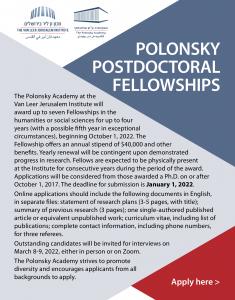
September 2021
An article Uncertainty and Inequality in Early Financial Thought: John Hicks as a Reader of Knight and Keynes written by Polonsky Academy Fellow, Dr. Roni Hirsch, was published in the Cambridge Journal of Economics 45, no. 5 (2021): 1145–1163
This article looks at the early reception of Knight’s and Keynes’ accounts of uncertainty, and their outsize role in the development of contemporary financial economics.
September 2021
Polonsky Salon
A conversation with Prof. Sergio Tenenbaum Dept. of Philosophy, University of Toronto on his new book Rational Powers in Action
Instrumental Rationality and Extended Agency Hosted by Dr. Rory O’Connell Polonsky Academy Fellow at the Van Leer Jerusalem Institute
September 2021
Academic Awards
The project, Global Patterns of Mass Violence: Ottoman Borderlands in Context, 1890-1920, by Polonsky Academy Fellow, Dr. Umit Kurt,has been awarded Discovery Early Career Research Award (DECRA), given by Australian Research Council and Government
As of Fall 2022, Umit Kurt will be working as a Senior Lecturer at the Center for Study of Violence in the History Department of the University of Newcastle, Australia
June 2021
The Polonsky Salon
Umit Kurt in conversation with Prof. Ugur Umit Ungo
May 2021
The Polonsky Salon
Daniel Telech in conversation with Prof. Pamela Hieronymi
May 2021
“The Armenians of Aintab”
A book “The Armenians of Aintab” The economics of Genocide in an Ottoman Province by the Polonsky Academy Fellow Umit Kurt, PhD, was published by the Harvard University Press on April 13, 2021
May 2021
Academic positions
The Polonsky Academy is proud to announce that Alberto Bardi, a second year fellow, was appointed as an Associate Professor at the Department of the History of Science at Tsinghua University in Beijing
May 2021
An International workshop
An International workshop Varieties of Moral Address Agency, Authority and Responsibility, co-organized by the Polonsky Academy Fellow, Daniel Telech, PhD and Prof. David Enoch of the Hebrew University of Jerusalem took place (digitally) on April 20-22, 2021
April 2021
Research Award
Ray Schrire was awarded a Research Fellowship by the Folger Shakespeare Library. The project Documenting Early-Modern Popular Mathematical Culture that is an integral part of Ray’s research at the Polonsky Academy, was selected for its exceptional merit by an international committee of scholars. The fellowship’s funds will be used to digitize early modern manuscripts found in libraries in the UK and Continental Europe. Ray aims to shed light on hidden aspects of the mathematical practices of early modern merchants, accountants, and shopkeepers.
March 2021
Academic Positions
The Polonsky Academy is proud to announce that Casper Storm Hansen, a fifth year fellow, was appointed as an Associate Professor at the Chinese Academy of Sciences’ newly founded Institute of Philosophy in Beijing.
March 2021
Palestine Along the Colour Line: Race, Colonialism, and Construction Labour, 1918–1948
An article by Nimrod Ben Zeev, Palestine Along the Colour Line: Race, Colonialism, and Construction Labour, 1918–1948,” was published in Ethnic and Racial Studies Journal.
March 2021
Eremia Chelebi Keomurchean (1637-1695) and the Foundation of the Western Armenian Intellectual Tradition in Ottoman Istanbul
Henry Shapiro presented a lecture Eremia Chelebi Keomurchean (1637-1695) and the Foundation of the Western Armenian Intellectual Tradition in Ottoman Istanbul at Haifa Center for Mediterranean History at Haifa University.
March 2021
The Polonsky Salon
A conversation with Prof. Bernard E. Harcourt
Tuesday | 02/03/21 | 07:00 pm
Participants:
Opening remarks: Prof. Shai Lavi, Director, the Van Leer Jerusalem Institute and Polonsky Academy
Prof. Bernard E. Harcourt, Columbia University
Hosted by Dr. Carmen Lea Dege, Polonsky Academy Fellow at the Van Leer Jerusalem Institute
>>>Program
February 2021
The sultan and his sycophants: Erdoğan is leading Turkey towards a bleak future
An Op-Ed The sultan and his sycophants: Erdoğan is leading Turkey towards a bleak future coauthored by Umit Kurt (with Oguz Alyanak) was published on the Open Democracy website
February 2021
Controversies about Astrology in the Arabic and the Byzantine Worlds
Alberto Bardi delivered an invited lecture, entitled Controversies about Astrology in the Arabic and the Byzantine Worlds, at the Israeli Institute of Advanced Studies. The event was organized by the Israeli Institute of Advanced Studies research group Cultural Brokerage in Pre-modern Islam
January 2021
Academic Positions
The Polonsky Academy is proud to announce that Orit Malka, our second year fellow, was appointed to a tenure-track joint position as an Assistant Professor in the Talmud Department and the Law faculty at the Hebrew University in Jerusalem. Orit will be the first woman in the 100 year history of the Talmud Department of the HUJ to obtain such a position.
December, 2020
Rabbinic Halakha and Roman law: How to Identify Influence
Orit Malka is co-organizing (together with Dr. Yair Furstenberg, Hebrew University of Jerusalem and Dr. Yael Wilfand, Bar Ilan University) an annual research workshop: Rabbinic Halakha and Roman law: How to Identify Influence. The workshop was hosted by the Talmud and Halakha department of the Hebrew University of Jerusalem.
Past sessions of the workshop – 1.11.20, 29.11.20, 27.12.20. The next session of the workshop will take place on 24.1.21.
December, 2020
2020s Existentialist Turn by Carmen Lea Dege
2020’s Existentialist Turn by Carmen Lea Dege, published August 2020 in the Boston Review and translated into Chinese and Spanish languages, was chosen by the readers of as the ninth most popular Boston Review essay of the year
December, 2020
Alma Igra in the World Literature Today
A creative nonfiction essay Chicken Soup: The Story of a Jewish Family by Alma Igra was published in the Winter 2021 issue of World Literature Today
December, 2020
Publication in Jerusalem Quaterly
An article by Nimrod Ben-Zeev “We Built This Country”: Palestinian Citizens in Israel’s Construction Industry, 1948–73 was published in the Jerusalem Quarterly’s winter 2020 issue
November, 2020
Publication in Revue d’Histoire des Textes
Alberto Bardi’s article The Transmission of a Byzantine Astronomical Commentary: Philological Problems and Editing Criteria was published in one of the most prestigious journals of textual criticism and philology, Revue d’Histoire des Textes (in Italian)
November, 2020
Formal Philosophy Conference
Casper Hansen participated in Formal Philosophy 2020, Moscow, Nov. 16-18, and gave a talk titled The Dogmatism Required to Avoid Learning through Induction. The conference was organized by The International Laboratory for Logic, Linguistics and Formal Philosophy (Higher School of Economics, Russia).
November, 2020
Awards
Polonsky Academy is delighted to announce that project, Global Patterns of Mass Violence: Ottoman Borderlands in Context, 1890-1920, developed by Polonsky Fellow Umit Kurt, has been awarded Discovery Early Career Research Award (DECRA), given by Australian Research Council and Government
November, 2020
New Biblical Readings: Conversations on New Scripture-centered Books
In the framework of VLJI series New Biblical Readings: Conversations on New Scripture-centered Books, Polonsky Fellow, Dr. Ofri Ilany talked to Dr. Yael Almog about her book Secularism and Hermeneutics. The book presents different ways, in which the Bible became a constitutive text of new political, intellectual, and aesthetic structures, whose overt and covert impact has shaped the world we live in.
28/10/2020
Call for Applications
The Polonsky Academy at the Van Leer Jerusalem Institute will award up to seven Fellowships in the humanities or social sciences for up to four years (with a possible fifth year in exceptional circumstances), beginning October 1, 2021. The Fellowship offers an annual stipend of $40,000 and other benefits. Yearly renewal will be contingent upon demonstrated progress in research. Fellows are expected to be physically present at the Institute for consecutive years during the period of the award. Applications will be considered from those awarded a Ph.D. on or after October 1, 2016.
The deadline for submission is January 1, 2021.
Online applications should include the following documents in English, in separate files: statement of research plans (3-5 pages, with title); summary of previous research (3 pages); one single-authored published article or equivalent unpublished work; curriculum vitae, including
list of publications; complete contact information, including phone numbers, for three referees.
Outstanding candidates will be invited
for interviews on March 8-9, 2021, either
in person or on Zoom.
Press here for the Call for Applications.
Press here for the Application Form.
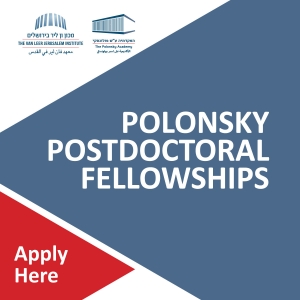
October 2020
Opening of the Academic Year
On October 20, the new academic year 2020-2021 was launched at the Polonsky Academy at VLJI. The Polonsky Fellows were greeted by the Director of VLJI Prof. Shai Lavi and listened to the opening lecture by Prof. Ruth HaCohen from HUJI on Sonic Solidarity in Times of Trouble.
October 12-13
Political Thought Workshop
Polonsky Fellows – Roni Hirsch, Jacob Abolafia and Guy Paltieli participated in the Inter-University Workshop on Political Thought. Guy Paltieli, who was in the organizational committee of the Workshop, chaired one of the sessions: Profit, Welfare and Justice.
Summer 2020
Professional Updates
Five Fellows obtained tenure-track positions and will teach from the next academic year in leading academic institutions:
Karma Ben-Johanan (2017 intake) – Humboldt University, Berlin
Elvira Di Bona (2015 intake) – University of Turin
Tanja Werthmann (2018 intake) – Hebrew University of Jerusalem
Rawia Aburabia (2019 intake) – Sapir college
Lucia Carminati (2018 intake) – Texas Tech University
June 2020
June at the Polonsky weekly seminar:
Prof. David Heyd from HUJI gave a talk on Better Not to Be Born: A Talmudic Debate
A group of Polonsky Fellows organized a discussion on the current situation (Covid-19), its histories, and what the future holds
Torbjorn Ottersen gave a talk on : The replay’s the thing? Nixon in China in Stuttgart
May 2020
May
Karma Ben-Johanan had published a book A Pottage of Lentils Mutual Perceptions of Christians and Jews in the Age of Reconciliation at the TAU University Press
March-May 2020
March -May at the Polonsky weekly seminar:
Karma Ben-Johanan – Jewish-Christian Relations and “Irrevocable” Problem of Political Theology
Umit Kurt – The Curious Case of Ali Cenani Bey:Story of a Genociaire
Guy Paltieli – Data Republic: Civic Virtues and AL Politics
Magdalena Luszczynska – In search for Eutopia. From a printer’s mistake to translator’s marginalia
Uri Weiss – Justice and Labor Negotiation
Daniel Telech – Praise as Moral Address
January – February 2020
January – February at the Polonsky weekly seminar:
Firat Kurt – Giving Messages, Creating Values: Financial Capitalism as the Infrastructure of Populist Mobilization
Assaf Tamari – R.Hayyim Vital’s Political Imagination: Localizing the Dream Messianism of Sefer ha-Hezyonot
Ella Klik – Media and the Accidental: The Lost Apollo 11 Tapes
Elvira Di Bona – On Music as the Language of Emotions
Rawia Aburabia – The Law on The Books Versus the Law in Action: Muslim Women in Polygamous Marriages Under The Jewish State
Casper Hansen – The dogmatism required to avoid learning from induction
10/02/2020
Tu Bish’vat (New Year of Trees) celebration
An initiative that became a tradition – a celebration of new beginnings, an introduction between the new Library Fellows and the Polonsky Fellows. Irit Kornblit of Library Fellows and Assaf Tamari of Polonsky Fellows gave greetings speeches.
1-2/01/2020
On 1-2 January, Polonsky Fellow Orit Malka in cooperation with Omer Michaelis from the Hebrew University of Jerusalem has organized a conference On Sacrifice in the frameworks of VLJI theme Sacredness Religion and Secularization
17/12/2019
German, Jew, Muslim, Gay: The Life and Times of Hugo Marcus
Professor Marc David Baer from the International History Department of London School of Economics and Political Science will give a talk at the Polonsky Weekly Seminar. Talk title is German, Jew, Muslim, Gay: The Life and Times of Hugo Marcus
November – December 2019
November – December 2019 at the Polonsky weekly seminar the Fellows have presented the following talks:
Lucia Carminati – Improvising and Humble. The Nineteenth-Century Migrants Whom Statisticians and Historians Have Neglected
Orit Malka – Testimony and Oath in Ancient Legal Thought
Alberto Bardi – The Celestial Bodies and the Problem of Knowledge in Fourteenth-Century Constantinople
Ofri Ilany – Astrology, Judaism and Homosexuality in the Diaries of Yedidiah (Eduard) Chavkin
Carmen Dege – Religion and the Dialectics of Enlightenment: Making Sense of the Turn to the Axial Age
04/11/2019
Call for Applications
The Polonsky Academy at the Van Leer Jerusalem Institute will award up to seven Fellowships in the humanities or social sciences for up to four years (with a possible fifth year in exceptional circumstances), beginning October 1, 2020. The Fellowship offers an annual stipend of $40,000 and other benefits. Yearly renewal will be contingent upon demonstrated progress in research. Fellows are expected to be physically present at the Institute for consecutive years during the period of the award. Applications will be considered from those awarded a Ph.D. on or after October 1, 2015. The deadline for submission is January 1, 2020. More information you can find here
21/01/2019
Tu B’shvat (New years of the trees) celebration
Polonsky Fellows and Junior Library Fellows celebrated Tu B’shvat. Ori Werdinger of the junior library Fellows gave a short explanation of Tu B’shvat and Uri Weiss of the Polonsky Fellows read from his and W. Auden poems.
03/01/2019
Round table discussion on Russian Historical Memory Today: Balancing between the Soviet and Pre-Soviet Pasts
Polonsky Academy Fellow Dr. Pavel Vasilyev organized a round table discussion in cooperation with The Van Leer Jerusalem Institute, The Polonsky Academy and The Hebrew University of Jerusalem. Prof. Alexander Etkind of European University in Florence chaired the discussion.
16/12/2018
End of year 2018 celebration
Polonsky Academy Fellows celebrated the end of 2018 by watching the Gospel according to St. Matthew by Paolo Pasolini.
12/12/2018
Guest speaker at Polonsky Seminar
Michael P.Steinberg, Professor of Music and German Studies at Brown University was a guest speaker at the Polonsky weekly Seminar. Prof. Steinberg gave a talk on The School of Listening: Music, Politics, Psychoanalysis.
20/11/2018
Polonsky Fellows Field Trip
Polonsky Academy Fellows went on a field trip to Mount Meron and Sefad. Dr. Assaf Tamari, one of the fellows, guided the trip. Assaf’s research is on Jewish Intellectual History, Kabbalah and Scientific Discourses, and he presented an interesting overview.
25/10/2018
Beginning of the academic year 2018-2019
Polonsky Fellows celebrated the beginning of the academic year 2018-2019 together with the Fellows of the Martin Buber Society. The event took place on Thursday, October 25 at Hebrew University.
07/11/2018
Call for Applications
The Polonsky Academy at the Van Leer Jerusalem Institute invites applications for up to six Polonsky Postdoctoral Fellowships in the humanities or social sciences tenable for up to five years, beginning October 1, 2019. The Fellowship offers an annual stipend of $40,000. Yearly renewal will be contingent upon demonstrated progress in research. Fellows are expected to be physically present at the Institute for consecutive years during the period of the award. Applications will be considered from those awarded a Ph.D. on or after October 1, 2012. The deadline for submissions is January 7, 2019.
For further information, please see here.
13/03/2018
Symposium: English-Only Academe? The Question of the Language of the Humanities and the Social Sciences in Israel
Israel’s higher education system is becoming increasingly integrated into the international academic community. This process has many positive aspects but also dangerous ramifications. One of those ramifications is the growing rift between scholars and the local society and culture.
The gathering was attended by researchers and officials in the higher education system who discussed the erosion of the status of the Hebrew language in the Israeli academic world. They also discussed the special, and even more fragile, state of Arabic in Israel’s academe.
The symposium was organized by Dr. Ofri Ilani , Polonsky Academy Fellow.
08/03/2018
16-17/01/2018
Conference: The Borders of Perception
Perceptual experience is undoubtedly central in our lives. It provides us with the bulk—if not all—of the information we have about the external world. It is crucial to our survival and the survival of our evolutionary relatives. It’s also central to most of the sources of meaning and enjoyment that we have in our lives.
These facts have contributed to a rich history of research on the philosophy of perception that goes back thousands of years. But the developments of the last few decades in cognitive and perceptual sciences have led to an explosion of new and innovative developments in the philosophy of perception as well.
The aim of this conference was to further these recent developments by bringing together several of the top scholars in the field to present and workshop new work on a range of philosophical topics related to perceptual experience. Bringing these scholars together also allowed them to see the relationship between their projects in a way that would be difficult to do outside of a conference of this nature.
The conference was organized by Dr. Elvira Di Bona (The Polonsky Academy) and Dr. Preston Werner (The Hebrew University).
12/11/2017
Guest Scholar: Prof. Hartry Field from New York University
We were honored to host Prof. Hartry Field from the Department of Philosophy at New York University, New York, USA. Prof. Field gave a lecture on “Modal Conditionals and the Semantic Paradoxes”, and held an open discussion with Polonsky Academy Fellows on his work in progress.
26/10/2017
Beginning of the New Academic Year
The academic year 2017-18 opened with an Orientation Day at the Polonsky Academy. On this occasion, we welcomed our new fellows who were introduced to continuing Fellows and to the Van Leer academic and administrative staff. Later that week, the new academic year was celebrated in a joint barbeque party for Polonsky Academy Fellows and the Martin Buber Society of Fellows at the Hebrew University.
10/09/2017
Book release:”The Essence of Choice in Medieval Jewish Philosophy”
We are pleased to announce that Dr. Shalom Sadik’s book “The Essence of Choice in Medieval Jewish Philosophy” (in Hebrew) has just been published by The Van Leer Institute Press and Magnes Press. Dr. Shalom Sadik is a Polonsky Academy Alumnus and currently serves as a senior lecturer in the Department of Jewish Thought at Ben-Gurion University of the Negev. For further particulars, please visit the following Here.
14/03/2017
Guest Scholar: Prof. Mark Risjord from Emory College of Arts and Sciences
We were honored to host Prof. Mark Risjord from the Department of Philosophy at Emory College of Arts and Sciences, Atlanta, Georgia, USA. Prof. Risjord held an open discussion with the Polonsky Academy Fellows on “Well-Being: Pluralism, Naturalism, and Interdisciplinarity”, and a workshop on writing academic grant applications. In addition, Prof. Risjord gave a public lecture at The Van Leer Jerusalem Institute titled “Improvisation and Social Action: Perspectives from Philosophy and the Social Sciences” .
05/03/2017
The Council of Higher Education approved two new programmes for higher education, which were designed and will be coordinated by a Polonsky Academy alumna and a current fellow.
We are delighted to congratulate Dr. Sinai Rusinek, Polonsky Academy alumna and Dr. Almog Behar, Polonsky Academy fellow, upon the Council of Higher Education’s approval of their two new programmes for higher education. The first, The Digital Humanities Programme at Haifa University, was designed by and will be coordinated by Dr. Sinai Rusinek. The second, The Arab-Jewish culture studies programme at Tel Aviv University (with collaboration of the Ben Gurion University of the Negev) was designed by and will be coordinated by Dr. Almog Behar.
19-20/02/2017
Workshop with Dr. Michael Sharp, an editor at CUP
We were honored to host Dr. Michael Sharp, a well-established editor in the general academic publishing world, with 17 years of experience as a commissioning editor at Cambridge University Press. Dr. Sharp led a two-day workshop about how to get one’s book published and discussed a number of issues in contemporary publishing. The workshop included general sessions for all fellows and individual meetings to consult fellows with regard to their publishing plans.
23/01/2017
Beyond “Crisis”: Meeting Points between the Humanities and the Sciences
We are happy to inform of a monthly colloquium for the Van Leer Campus, which will bring together Polonsky Academy Fellows and Alumni, with researchers of The Van Leer Jerusalem Institute. At each session, two researchers will select a reading that will be the basis of discussion and give a short presentation on the reading. This project is an innovative exploration of a future for the sciences and the humanities beyond the current sense of crisis. The colloquium is for invitees only.
program
18/12/2016
Fellows and Alumni meeting
In the framework of the Polonsky Academy Fellows’ Weekly Seminar, we hosted four of the Polonsky Academy Alumni. Following an opening talk by Prof. Gabriel Motzkin, alumni shared their experience in the processes of Book Publishing and Job Talks, and conversations were held between fellows and alumni.
12-14/12/2016
Conference: Iran between the Sasanians and Early Islam
On the basis of textual and material sources, this workshop investigated the way in which, as well as the extent to which elements of Iranian culture, art, religion, ideology and politics were transplanted into the Islamic world and transformed by the emergent Islamic culture. This conference was organized by Dr. Domenico Agostini (Polonsky Academy Fellow, The Van Leer Jerusalem Institute); Prof. Shaul Shaked (The Hebrew University of Jerusalem and Israeli Academy of Sciences and Humanities); Dr. Julia Rubanovich (The Hebrew University of Jerusalem); and Dr. Michael Shenkar (The Hebrew University of Jerusalem).
01/11/2016
Call for Applications
The Polonsky Academy at the Van Leer Jerusalem Institute invites applications for up to six Polonsky Postdoctoral Fellowships in the humanities or social sciences tenable for up to five years, beginning October 1, 2017. The Fellowship offers an annual stipend of $40,000. Yearly renewal will be contingent upon demonstrated progress in research. Fellows are expected to be physically present at the Institute for consecutive years during the period of the award. Applications will be considered only if the Ph.D. dissertation was completed no longer than seven years ago. The deadline for submissions is February 1, 2017.
For further information, please see here.
29/10/2016
Book release: ‘Narava spremembe v jainisticni filozofiji (Nature of Change in Jain Philosophy)’
We are pleased to announce that Dr. Ana Bajzelj’s book ‘Narava spremembe v jainisticni filozofiji (Nature of Change in Jain Philosophy)’ has just been published by Ljubljana University Press.
07/07/2016
Book release: ‘Freedom in the Arab World: Concepts and Ideologies in Arabic Thought in the Nineteenth Century’
We are pleased to announce that Dr. Weal Abu Uksa’ book Freedom in the Arab World: Concepts and Ideologies in Arabic Thought in the Nineteenth Century has just been published with Cambridge University Press. For further particulars, please visit the following Here.
19/05/2016
New Work on Ineffability
This workshop organized by Dr Silvia Jonas will bring together the leading analytical philosophers working on the topic of ineffability in order to discuss and exchange ideas and open up new directions for further research.
Venue: Polonsky Academy, The Van Leer Jerusalem Institute
